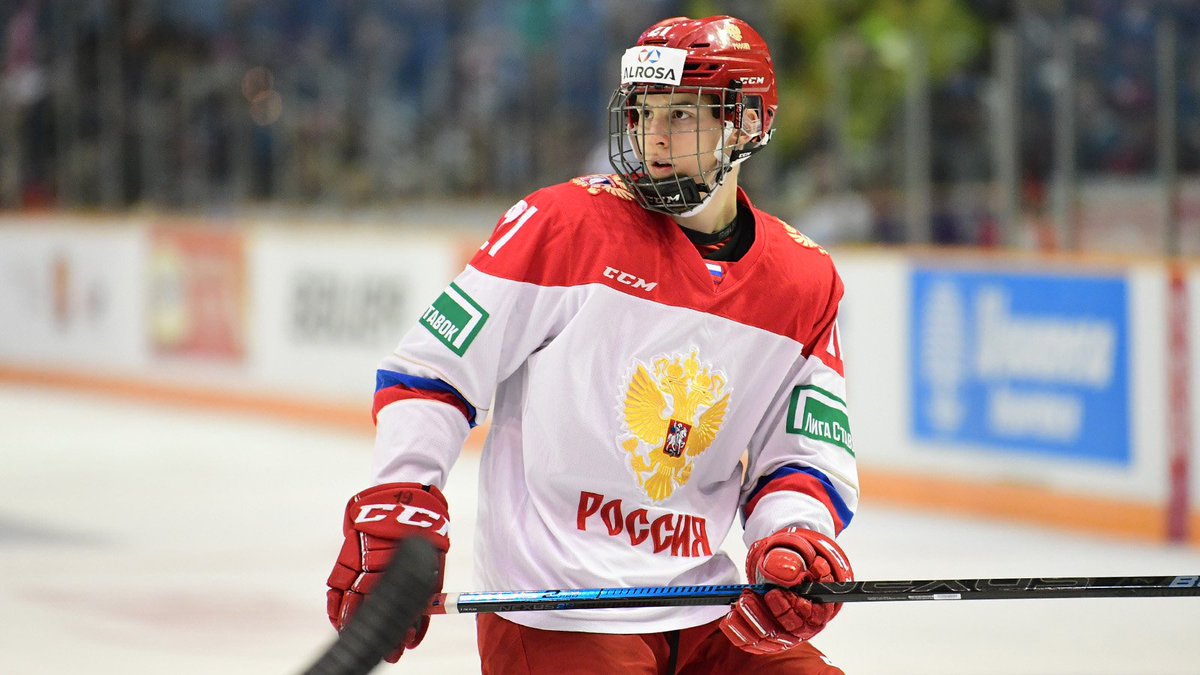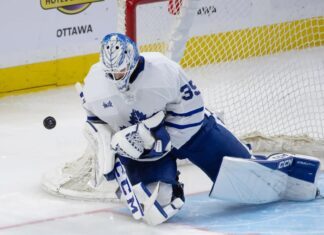The World Junior Hockey Championships have been a staple of the holiday season for decades.
Given that there hasn’t been NHL hockey for several months now, I’m looking forward to this tournament even more than usual.
Let’s take a look at who could win the gold at this year’s event as well as the six prospects participating from the Toronto Maple Leafs organization.
Team Canada
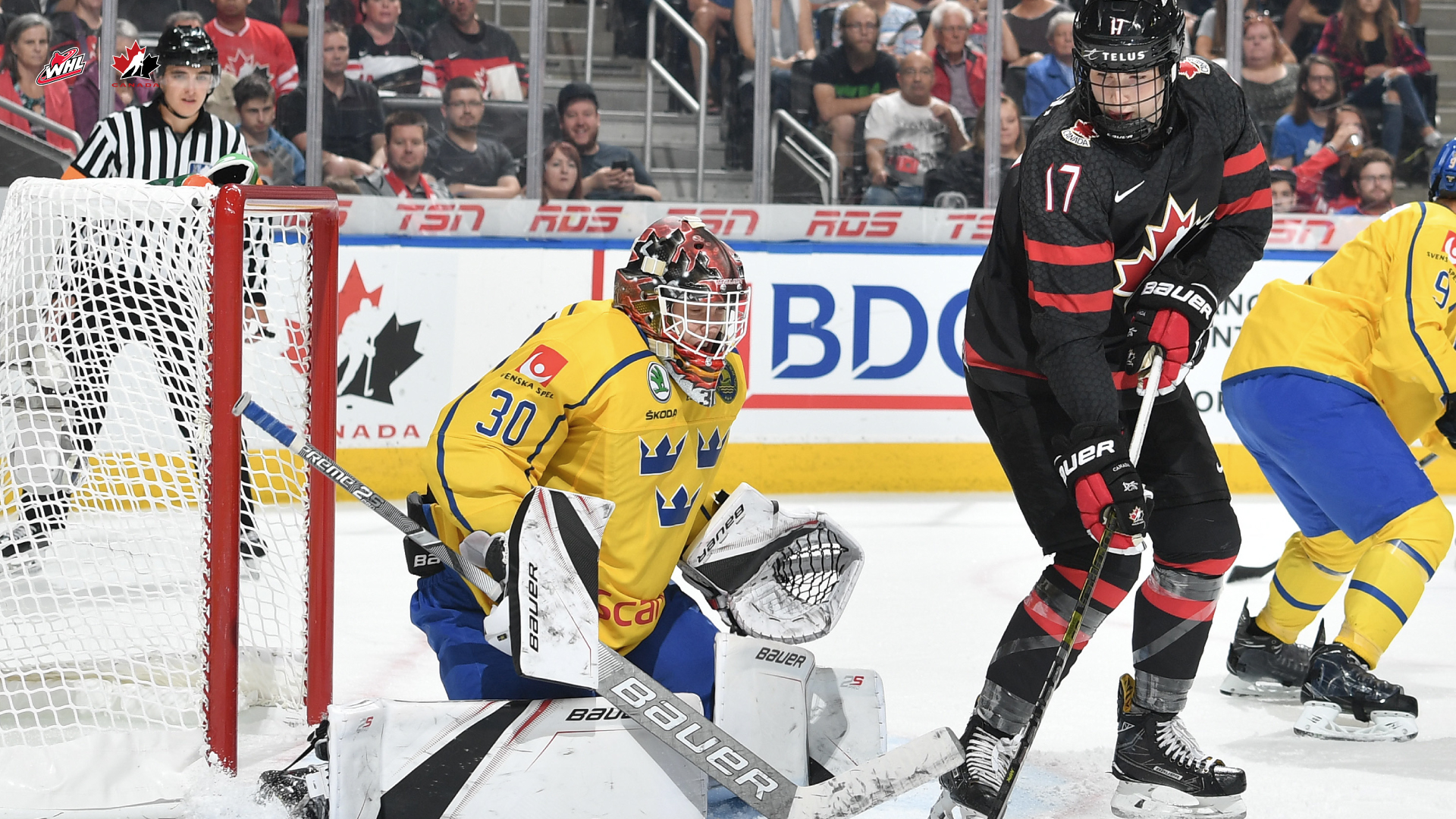
On paper, Canada is a dominant team with questionable goaltending. All 14 of their forwards are former first-round picks, and six of their eight defensemen are as well. Centermen Kirby Dach and Quinton Byfield have a chance to be the two best players in this tournament; under regular circumstances, they’d likely be playing in the NHL rather than playing for their country. In addition, Bowen Byram and Jamie Drysdale are the two best defensemen in this tournament. Canada certainly carries plenty of star power.
It looks like Byram and Drysdale will start the tournament together. Behind them, Canada’s group of defensemen are big, strong, and physical. Thomas Harley is perfectly capable of anchoring a strong second-pairing, as the Dallas Stars prospect is 6’3″ and a strong puck mover, plus he already has an NHL game under his belt. If Byram and Drysdale weren’t participating, Harley would have a reasonable chance to be the best defenseman in this tournament.
Braden Schneider, Kaiden Guhle, Kaedan Korczak, and Justin Barron are all big and strong defenders who can out-muscle their opponents. At least one of them probably won’t have a great NHL career, but at this level, they are simply bigger and stronger than everyone else. It will be difficult to get to the high-danger areas against Canada as a result. Unless their goaltending is terrible, they figure to have a good penalty kill as well. Of this group of four, Barron is the most offensively-tilted, while Los Angeles Kings prospect Jordan Spence provides another high-end puck mover behind Byram and Drysdale.
Up front, Dach and Byfield are the team’s biggest stars, but there’s plenty of depth behind them as well. Avalanche prospect Alex Newhook, one of the best scorers in college hockey last season, is certainly talented enough to lead this tournament in scoring. Jets prospect Cole Perfetti is an absolute magician with the puck; same as Newhook, he figures to be a major part of Canada’s power play. Like Dach and Byfield, Sabres prospect Dylan Cozens would likely be playing in the NHL right now under regular circumstances and also figures to be a top player in this event.
It looks like the 6’4″ Dach will start the tournament with the 6’3″ Cozens, and the duo will dominate in physical battles. Byfield is a 6’4″ center who transitions the puck like a 5’10” speedster, while both Dylan Holloway and Dawson Mercer are strong forecheckers. Capitals prospect Connor McMichael was a point-per-game contributor for Canada at last year’s tournament. Sabres prospect Jack Quinn is one of the better pure goal scorers at this event.
Add in Flames prospects Connor Zary and Jakob Pelletier, Hurricanes prospect Ryan Suzuki, Golden Knights prospect Peyton Krebs, and Predators prospect Philip Tomasino — now you have incredible scoring depth. There are no real weak links up-front this year to the point where it wasn’t a shock when Seth Jarvis (who scored 98 points in 58 WHL games last season) was cut from the team.
Canada is bigger, faster, and more skilled than any other team in this tournament. They should have no problem out-playing their opponents, but as we all know, goaltending can make or break a team’s chances in a single-knockout tournament. Rangers prospect Dylan Garand was a fourth-round pick, Panthers prospect Devon Levi was a seventh-round pick, and Taylor Gauthier was passed over in back-to-back drafts. While Canada does not have a clear #1 starter, all three of USA, Russia, and Sweden have an A+ goaltending prospect in net.
This Team Canada roster could remind us of their 2015 lineup, which dominated the tournament and won gold. Not only did they consistently outplay their opponents, but goaltenders Zach Fucale and Eric Comrie also exceeded expectations as well. However, this roster could also end up reminding us of their 2016 lineup, where a team led by Mitch Marner, Brayden Point, Mat Barzal, Travis Konecny, Dylan Strome, and Thomas Chabot were eliminated in the quarterfinals largely due to shaky goaltending. Canada enters this tournament as the clear favourite, but one goaltending performance can change that in a hurry.
Team USA
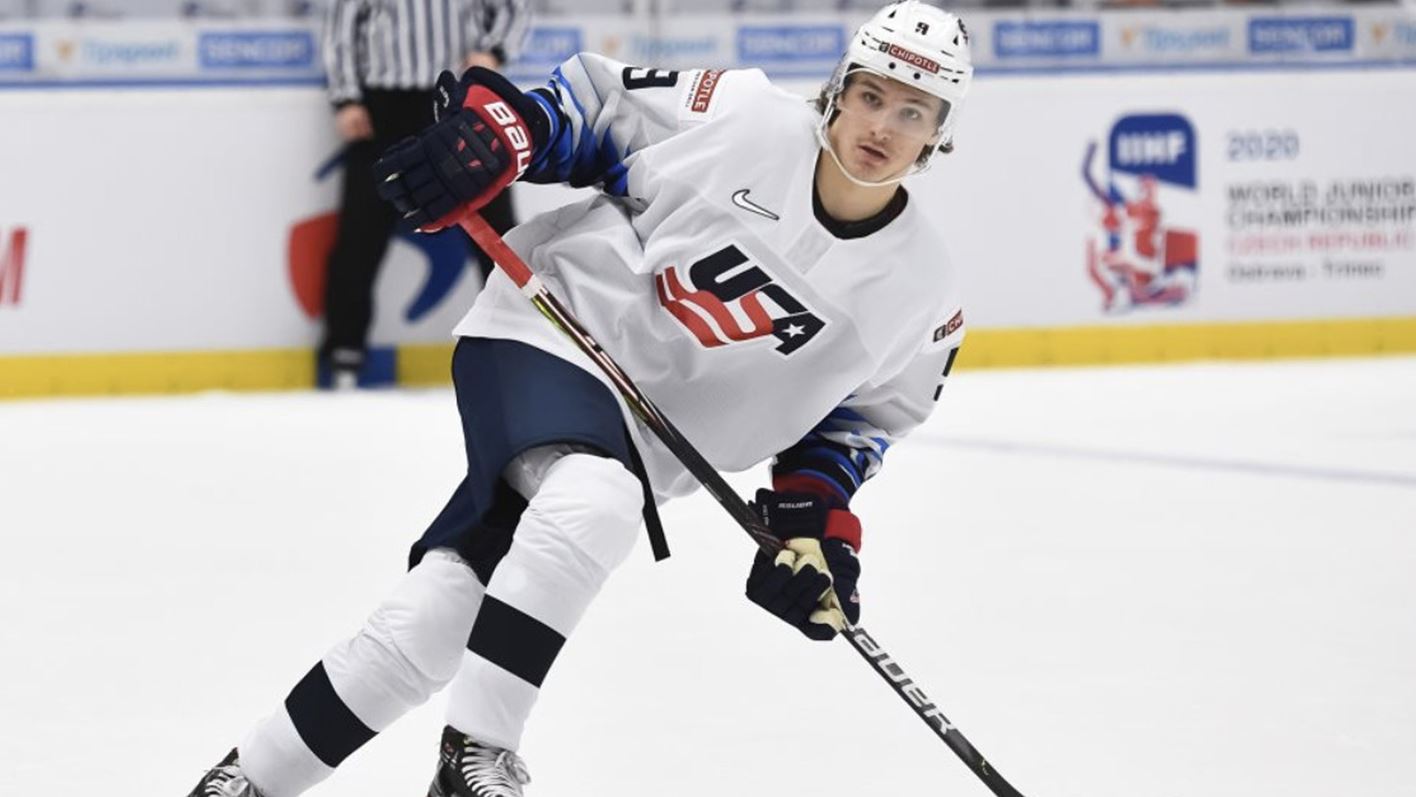
Team USA had a rough week, as Leafs prospect Nick Robertson will not be participating in this event and the team lost forwards John Beecher and Thomas Bordleau as well. They’re basically a forward line short, but even though they’re a bit short-handed, this is still the second-best roster in this tournament.
Panthers prospect Spencer Knight, who was the 13th overall pick in 2019, put up a .936 save percentage in six games against this age group way back at the U18 tournament. There is no reason to think that he can’t dominate again.
Even without Robertson, this team boasts a ton of scoring talent. Habs prospect Cole Caufield is a wicked goal scorer. Kings prospect Arthur Kaliyev scored four goals and five games in last year’s event. Considering Golden Knights prospect Brendan Brisson also carries an elite one-timer, you can easily make the case that Team USA has three of the top five shooters in this event. Their power play could be lethal as a result, and even if they get out-shot against other top teams, they have the goaltending and shooting talent to pull out a win on the scoreboard.
Ducks prospect Trevor Zegras, a star in last year’s event, should have no problem racking up plenty of highlight-reel assists once again. Kings prospect Alex Turcotte, the fifth overall pick in 2019, will be a driving force on one of the top two lines. Center Matthew Beniers is one of my favourite prospects in the 2021 draft class who already looks like a dominant two-way center at Michigan (the hype train is about to take off!).
Wild prospect Matt Boldy, the 12th pick of the 2019 NHL draft, is a power forward who figures to be a key part of this roster as it lacks size and strength elsewhere. Undersized forwards Bobby Brink and Brett Berard are perfectly capable of producing secondary scoring for this lineup, but this team’s fourth line won’t compare to Canada’s fourth line.
On defense, both Jake Sanderson (Senators) and Cam York (Flyers), have the potential to be one of the best defensemen in this event. Brock Faber (Kings) and Ryan Johnson (Sabres) are also solid defenders, so this group can matchup with just about any team outside of Team Canada.
With great shooters and a strong goaltender, this team probably has a lead in a game if they are tied in shots on goal. Canada should outplay them, and both Sweden and Russia might as well, but it doesn’t take players like Caufield many chances before he puts the puck in the net.
Canada often gets into penalty trouble as they adjust to the IIHF rules, and if they do that against Team USA, they will be playing with fire. Ultimately, this American team carries the star power to be considered the second-best team in this event, but the loss of Robertson, Bordeleau, and Beecher no longer makes them a clear #2.
Team Sweden
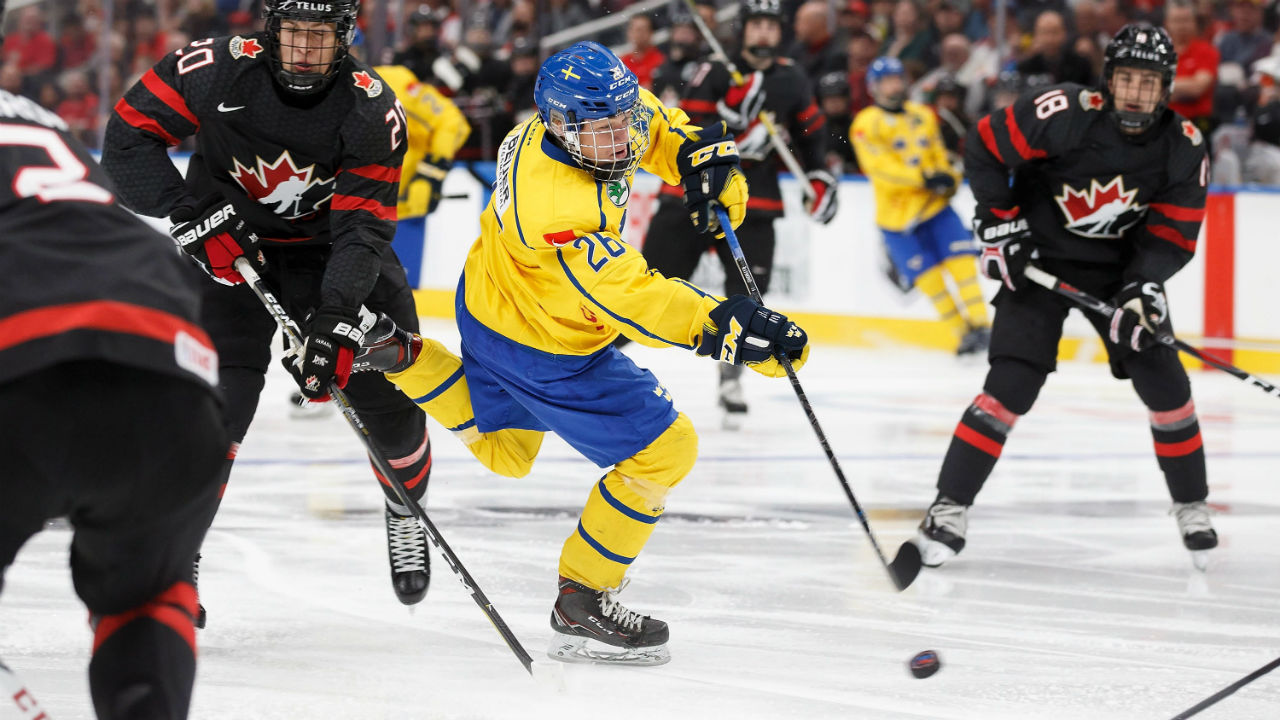
Red Wings prospect, Lucas Raymond, is a star. The fourth overall pick of the 2020 draft draws similarities to Mitch Marner and dominated both the Hlinka-Gretzky and U18 tournaments against this age group. There’s no reason to think he won’t dominate again. Like Marner, he’s a highly talented scorer who also reads the game well and helps his team in all-situations. I absolutely love watching him play.
Devils prospect, Alexander Holtz, is easily one of the best goal scorers in this tournament. Paired with Raymond at event after event, he’s bound to be a nightmare for opposing goalies. Sweden’s forward depth is a bit weak behind their elite duo, but their two stars will be able to carry a strong top line and powerplay unit.
Like most years, Sweden will likely be carried by their defense and goaltending. Kings prospect, Tobias Bjornfot, is already a regular in an AHL lineup and should log major minutes in a shutdown role. Victor Soderstrom (Coyotes), who was the 11th overall pick in the 2019 draft, is also destined to play major minutes in a shutdown role. There is also Philip Broberg (Oilers), the eighth overall pick of that draft, who scored in bunches against this age group at both the Hlinka-Gretzky and U18 tournaments. Add in Albert Johansson, an underrated prospect of the Red Wings, and Emil Andrae (Flyers) — an undersized puck-moving defenseman who plays bigger than he is — and it’s easy to see why this is the strength of this team. Would you expect anything else from Team Sweden?
In net, Sweden has a potential future NHL star in Jesper Wallstedt, who could be a top-five pick in this upcoming draft class. Already performing well in Sweden’s pro league, he was great at both the Hlinka-Gretzky and U18 tournaments. They also have Lightning prospect Hugo Alnefelt, who posted a .924 save percentage in last year’s tournament and also performed well at the Hlinka-Gretzky and U18 tournaments.
The game plan for the Swedes against top teams is simple: shutdown the opponent, and wait for Raymond and Holtz to find their way onto the highlight reels. Secondary scoring could make or break this team, but players such as Noel Gunler (Hurricanes), Zion Nybeck (Hurricanes), and Emil Heineman (Panthers) offer some potential in this area. Red Wings prospect Theodor Niederbach, who is off to a great start in Sweden’s junior league this season, will likely start the tournament in between the team’s two stars.
The story of Team Sweden is similar to Team USA. They have good goaltending, a few potential stars on defense, and a couple of forwards who are more than capable of winning tournament MVP. Like Team USA, they are without a few key forwards and their depth up-front doesn’t come close to challenging Team Canada. They don’t quite have as many strong scoring weapons as Team USA, which is why they’re slightly behind them in this power ranking.
Team Russia
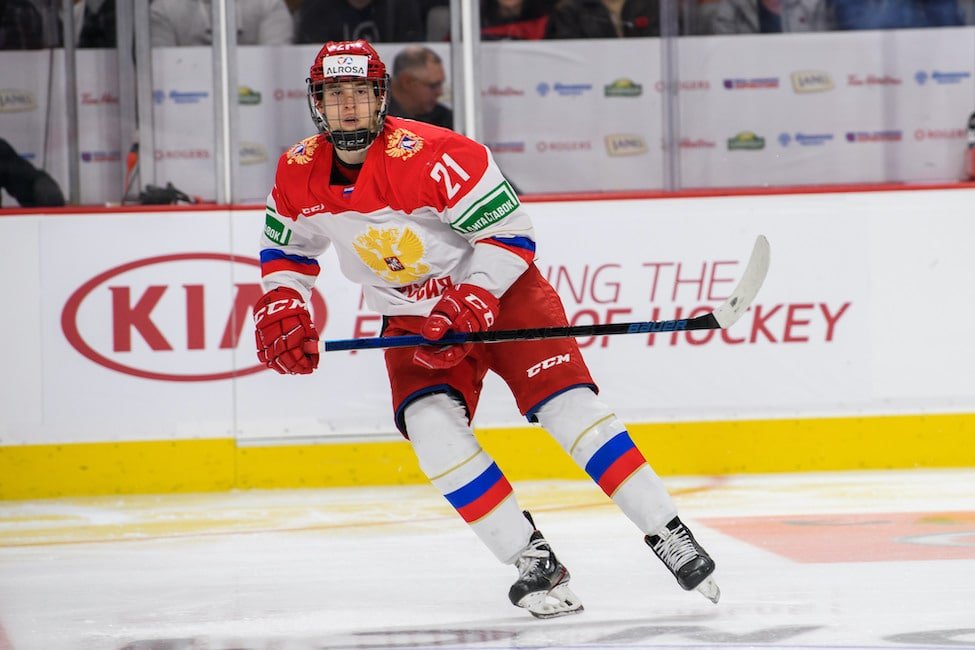
I have Russia as the fourth-best team in this tournament, but given their forwards and goaltending, you could make the argument to have them as high as #2. Yaroslav Askarov (Predators), the 11th overall pick of this year’s draft, has dominated against this age group plenty of times over the years. His best performances include a .960 save percentage at the Hlinka-Gretzky tournament, a .954 save percentage at the World Jr. A Challenge, and a .948 save percentage way back at the U17 tournament. Oh, and he also boasts a .962 save percentage in seven KHL games this season.
Askarov struggled in last year’s event, but everyone knows that he’s perfectly capable of stealing a game or two (or three!). Everyone expected a Jack Hughes-led Team USA to win the U18 tournament, but Askarov and Team Russia provided a huge upset in the semi-finals. If Russia’s defensemen perform well, this team will be a serious threat to win the tournament.
Vasili Podkolzin (Canucks) and Rodion Amirov (Leafs) are good two-way wingers who help their team in transition and have been dominant when paired together in the past. While Russia may end up separating them to balance out their lines, it looks like they will start the tournament together on the top line.
Podkolzin, who jolted his way into the top 10 of the 2019 class with eight goals and three assists in five games at the 2018 Hlinka-Gretzky tournament, is a big and strong power-winger who is highly competitive. Amirov is also no stranger to making his presence known in these best-on-best events, as he was named one of the three best forwards on the Media All-Star Team in last year’s U18 tournament alongside Jack Hughes and Cole Caufield. The Leafs prospect is a standout skater and transition player whose two-way game helps his team on the penalty kill.
Russia’s forward group is also quite strong up the middle. Marat Khusnutdinov (Wild) is on the smaller end, but he carries the speed, grit, and competitiveness to match up against just about anyone. Vasili Ponomaryov (Hurricanes) is also a strong two-way center who had no issues scoring at the Hlinka-Gretzky tournament. Leafs prospect Mikhail Abramov, one of the better scorers in the QMJHL, boasts the skill, vision, and shot to rack up plenty of points. Abramov is on the smaller-end — and I’ll be interested to see how his two-way game stacks up at this event — but he’s certainly talented enough to be one of Russia’s leading scorers.
Like most years, the big questions about Team Russia come on defense. I’m a big fan of Sharks prospect Artemi Knyazev, but he’s not quite a true #1 defenseman in this tournament, while the depth behind him is a bit iffy. Shakir Muhamadullin was a first-round pick of the Devils this year and Daniil Chayka will likely be a first-rounder in 2021, but both players are on the younger end for this event. I don’t think either player will be a huge difference maker.
Ultimately, this team’s fate lies in their goaltender’s hands. If Askarov plays like did in last year’s tournament, this team has little to no chance at gold. He was only 17 last winter, though. If he dominates as he has in the past against his age group, it’s easy to envision this team winning the tournament.
Team Finland
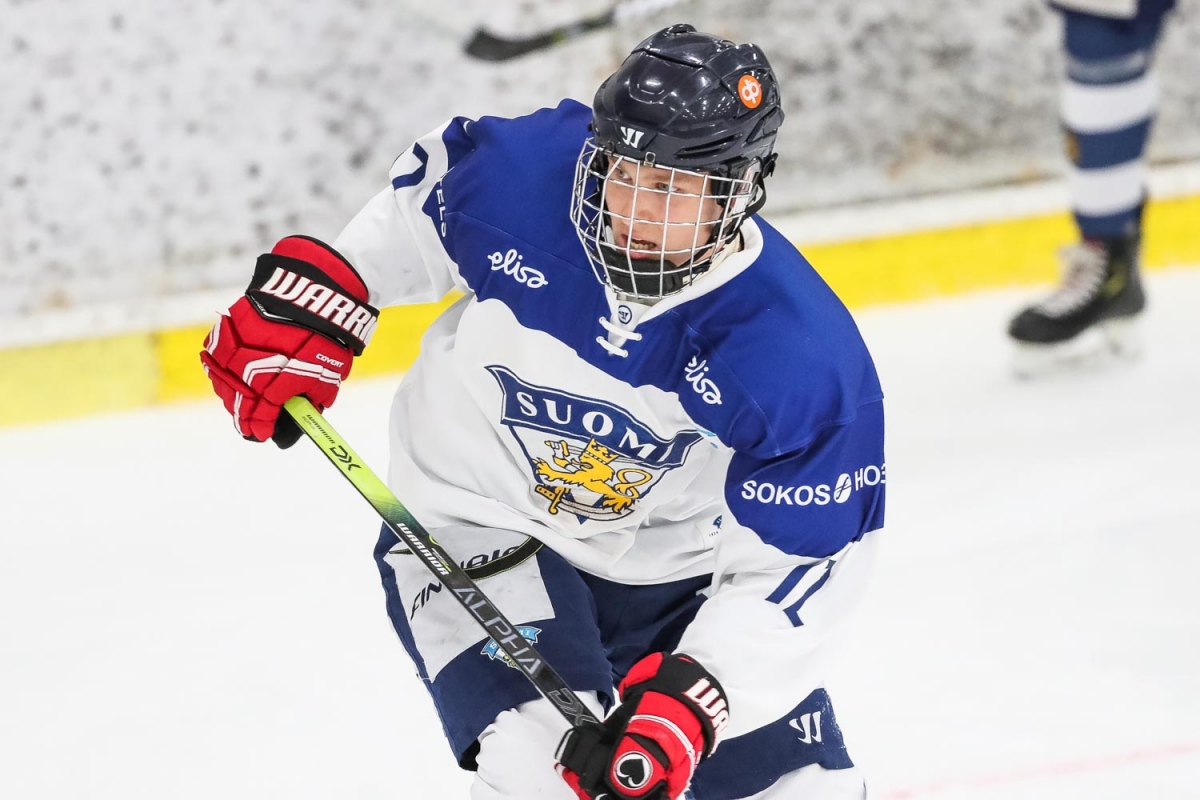
Like Canada, Finland has won three of the past seven tournaments — an incredible accomplishment. They’re led by Panthers first-round pick Anton Lundell, who is already scoring at over a point-per-game rate in Finland’s pro league and is also known for his strong two-way game. Lundell, a top player in this age group for years, already has a gold medal from the World Juniors, as he actually played in this event two years ago. If Finland is going to win gold, they’re going to need Lundell to be one of the top players of the tournament.
It’s easy to envision goaltender Joel Blomqvist, a second-round pick of the Penguins this year, stealing a game or two. The defense in front of him is also quite strong, led by Jets prospect Ville Heinola, who was the 20th overall pick back in 2019. Heinola already has eight NHL games under his belt and this is his third time participating in this event, so he also already won gold before.
Leafs prospects Mikko Kokkonen and Topi Niemela will also play big roles on the back-end. Kokkonen, Toronto’s third-round pick in 2019, was a steady defensive presence for Finland in last year’s tournament. Niemela was Toronto’s third-round pick this year and should pair with one of Heinola or Kokkonen. A high-end skater who can keep up with opposing top forwards, while he’s only 18, he’s never looked out of place against older competition. Other defensemen on this Finnish squad include Eemil Viro (Red Wings), Kasper Puutio (Panthers), Matias Rajaniemi (Islanders), and Santeri Hatakka (Sharks). The only undrafted player on the back-end is Ruben Rafkin, who I was quite surprised to see passed over this year.
Behind Lundell, the most exciting forward on this roster is Brad Lambert, who is expected to be a top pick in the 2022 draft. However, it’s tough to gauge how much of an impact he’ll have at this age, particularly at five-on-five. Kings prospect Kasper Simontaival, who was a third-round pick in this year’s draft, will be counted on to provide offense, as he was a big point producer at both the Hlinka-Gretzky and U18 tournaments.
Finland also carries a couple of 2020 second-round picks in Roby Jarventie and Roni Hirvonen. Jarventie (Senators) is a 6’3″ scoring winger with a limited track record in international tournaments, but he is off to a good start in Finland’s pro league. Hirvonen (Leafs) will play up-the-middle behind Lundell and will be counted on for secondary scoring. A skilled forward who plays a hard-nosed style, while he’s not the biggest or fastest player on the ice, Hirvonen did manage to score four goals in three games at the Hlinka-Gretzky tournament.
Finland’s bottom two forward lines look mediocre at best, and it’s tough to see this team winning gold as a result. As usual, they will likely try to play a low-event game and count on their top players to score a goal or two on the power play. They can easily provide an upset or two, but they’re a clear notch below the four top teams on paper.
Other Teams
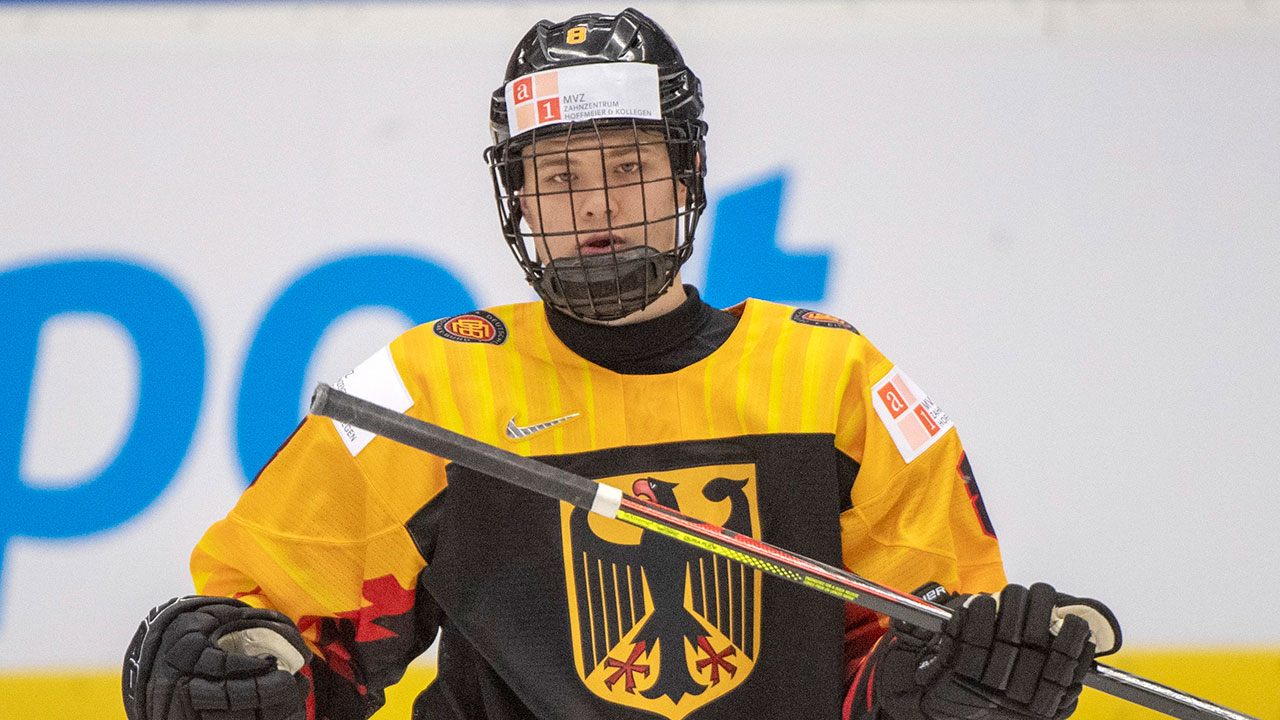
Germany was such a fun team to watch in last year’s tournament, but they’ve lost a ton of depth. Moritz Seider, the sixth overall pick of the 2019 draft, is not participating in this year’s event, and he was a massive part of their team last year. Another former first-round pick, Dominik Bokk, is now too old for this tournament, while Blackhawks first-round pick Lukas Reichel has been ruled out. They’ve lost three of their top players from last year, and there’s simply no way to replace that type of production.
Tim Stutzle (Senators) will star once again, and John-Jason Peterka (Sabres) will be a great side-kick, but this team will be heavily out-scored when they’re not on the ice.
Like Germany, Austria will have a star of their own in Wild prospect Marco Rossi. As the reigning OHL MVP, Rossi could have been in the running to win tournament MVP if he was on a better team, but they likely won’t go far enough for that to happen. His team will get crushed when he’s off the ice, but he’s good enough to make Wild fans watch every single one of Austria’s games.
I don’t have much to say about Switzerland, Slovakia, or the Czechs. The Czechs have the strongest roster of the three — and Habs prospect Jan Mysak is pretty fun to watch — but I’d be quite surprised if they brought home a medal.
Leafs Prospects
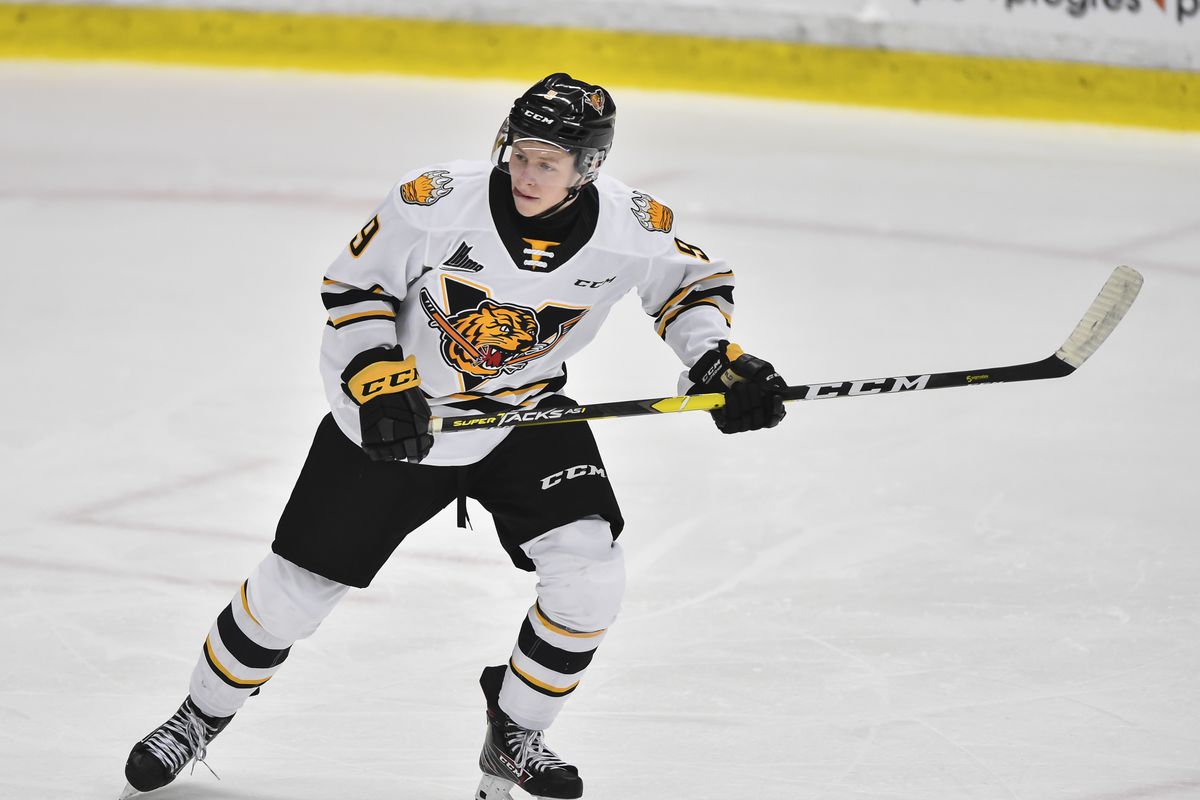
It’s a good year to watch this tournament as a Leafs fan, as they have six players participating, which is twice as many as last year. That’s pretty good considering that Nick Robertson will be off at the Leafs camp. The six players are split between just two teams, which makes them easy to follow:
Russia: LW Rodion Amirov, C Mikhail Abramov, G Artur Akhtyamov.
Finland: C Roni Hirvonen, RD Topi Niemela, LD Mikko Kokkonen.
Artur Akhtyamov will be backing up a potential tournament MVP in Yaroslav Askarov, and it’s tough to tell if he’ll play at all. Askarov is a rare goalie who catches with his right-hand, so that’s a pretty easy way to tell if he is playing.
You probably won’t see the two Finnish defensemen score a highlight-reel goal, but both Niemela and Kokkonen should be steady defenders. Niemela’s skating really stands out, and it will be quite convenient for our viewing purposes if they are paired together. Hirvonen will get plenty of ice time, including power-play time, so you should see a few points out of him. Both Hirvonen and Niemela are young enough to play in next year’s tournament, so if they’re quite good this year, they’ll be expected to be top players against younger competition next year.
The stars of the show for Leafs fans will be the Russian forwards: Mikhail Abramov and Rodion Amirov. Abramov is a pretty wicked playmaker who seems bound to find his way onto a highlight reel or two and will certainly help on the power play. Amirov is the better prospect, though, and if he scores as he did at the U18 tournament, everyone will be calling him the steal of the 2020 draft. Even if he doesn’t rack up as many points as expected, there won’t be much of a reason to panic, as he was a big scorer at the Karjala Cup this fall and doesn’t project to be an empty-calories scorer anyway.
Prediction
My prediction is that Canada wins gold over the United States. Stacked with both star players and depth, Canada’s roster should outplay everyone they face. The United States should be better defensively than Russia and offer more scoring depth than Sweden. Since Sweden has no Leafs prospects, I’m taking Russia over Sweden in the bronze medal game. Of course, given the nature of this tournament, these predictions can go south in a hurry. Anything can happen!
Enjoy the tournament.






















